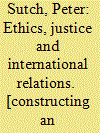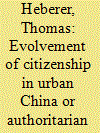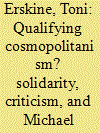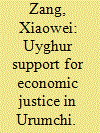|
|
|
Sort Order |
|
|
|
Items / Page
|
|
|
|
|
|
|
| Srl | Item |
| 1 |
ID:
088363


|
|
|
|
|
| Publication |
2009.
|
| Summary/Abstract |
This article discusses the appropriateness of western bioethics in the African setting. It focuses on the decision-making process regarding participation in health research as a contested boundary in international bioethics discourse. An ethnomethodological approach is used to explain African ethics, and African ethic is applied to the decision-making process in the African community. An HIV/AIDS surveillance project is used as a case study to explore the concept of communitarianism. The article argues that what exists in Africa is communal or social autonomy as opposed to individual autonomy in the West. As a result, applying the western concept of autonomy to research involving human subjects in the African context without adequate consideration for the important role of the community is inappropriate. It concludes that lack of adequate consideration for community participation in health research involving human subjects in Africa will prevent proper management and lack truly informed consent.
|
|
|
|
|
|
|
|
|
|
|
|
|
|
|
|
| 2 |
ID:
118232


|
|
|
|
|
| Publication |
2012.
|
| Summary/Abstract |
The financial crisis which began in 2007 has been widely interpreted as a crisis of neoliberalism, akin to the crisis of Keynesianism of the 1970s. But there is little sign of a major paradigmatic alternative, either in theory or in practice. This article looks at how the crises and failures of neoliberalism are occurring at a micro-policy level, where they are interpreted in terms of the fallibility of individual rational choice. Policy responses to this crisis, drawing on more psychologically nuanced accounts of economic behaviour, can be described as 'neocommunitarian', inasmuch as they echo the communitarian critique of the liberal self. Where neoliberalism rests on a vision of the individual as atomised and rational, neocommunitarianism treats individuals as governed by social norms and incentives simultaneously. And where neoliberalism subjects individuals to periodic audit organised around targets and outputs, neocommunitarianism conducts a constant audit of behavioural fluctuations in real time.
|
|
|
|
|
|
|
|
|
|
|
|
|
|
|
|
| 3 |
ID:
049288


|
|
|
|
|
| Publication |
London, Routledge, 2001.
|
| Description |
224p.
|
| Series |
Routledge advances in international relations and global politics; 13
|
| Standard Number |
9780415232746
|
|
|
|
|
|
|
|
|
|
|
|
Copies: C:1/I:0,R:0,Q:0
Circulation
| Accession# | Call# | Current Location | Status | Policy | Location |
| 044649 | 172.4/SUT 044649 | Main | On Shelf | General | |
|
|
|
|
| 4 |
ID:
089975


|
|
|
|
|
| Publication |
2009.
|
| Summary/Abstract |
Frequently, civil society is identified with an increase of associational life. Yet, in this article it is argued that the emerging of citizens and citizenship is a vital precondition for developing a civil society. Here I will focus on a concept of citizenship grounded in a local context. Accordingly, it focuses on both the public discourse on citizenship and the institutional effects with regard to citizenship generated by the establishment of urban neighborhood communities and the enhancement of participation. The author's hypothesis is that by virtue of newly established neighborhood communities in urban areas, a gradual transition from 'masses' to citizens seems to manifest itself. This transition process will be examined in four central fields: (a) community participation and grassroots elections; (b) self-administration (autonomy) and the attitudes of residents thereto; (c) the growth of individual autonomy; and (d) value engineering by the party state. As the institutional preconditions for a civil society in China are widely lacking, the party-state conceives its role in initiating them. It is precisely the combination of the top-down establishing of neighborhood communities and grassroots elections, mobilized participation and volunteers, which gives evidence of the party-state's intention to generate structures of an (illiberal and controlled) civil society. Citizen status has not yet been fully achieved in China; yet the state-led activation in urban neighborhood communities shows that the political leadership has decided to chart this course. Finally the article classifies the concept of neighborhood communities as a model of 'authoritarian communitarianism'.
|
|
|
|
|
|
|
|
|
|
|
|
|
|
|
|
| 5 |
ID:
134342


|
|
|
|
|
| Summary/Abstract |
This article interrogates the continuing relevance of the contractarian governance paradigm to resource governance and the impact of exploitation on the local population and environment in the Democratic Republic of Congo (DRC), Zimbabwe and Ghana. It highlights the susceptibilities of their governance processes, particularly the roles of the elites of the host communities, the multinational corporations, and the governing authorities in appropriating resources for their personal interests, resulting in tensions and conflicts. This scenario is borne out of inept leadership, as well as the defective and compromised administrative mechanisms operational in these countries. In view of this, the article underscores the need for a ‘new governance management paradigm’ anchored on a communitarian framework, which incorporates all stakeholders, to guarantee sustainable peace and prosperity, particularly in conflict zones. The article therefore concludes that achieving a nexus between forestry, mining activities and economic development in these countries will require a restructuring of the existing governance mechanisms; and advocates for a new governance model capable of curbing the excesses of local and foreign hegemony, including a total overhaul of the seemingly compromised supervising authority.
|
|
|
|
|
|
|
|
|
|
|
|
|
|
|
|
| 6 |
ID:
164015


|
|
|
|
|
| Summary/Abstract |
Community Policing (CP) is a new philosophy of police administration
which believes that creative solutions for various problems can be
sought and quality of life in the community can be improved only by
working together via police-community interaction. Mainstream CP
literature starts with a basic observation which informs every theory
throughout maintaining that in a democratic State run by the people we
must understand how common people conceive the nature of crime and
role of the police. A cursory review of literature reveals that in spite of
its success, there is no scientific, logical, predictable, refutable theory
explaining and explicating, predicting and refuting CP practices. The
present paper is an attempt to do so and would analyse various
theoretical constructs that support and strengthen the basic ideas relating
to disorganisation and social control, democratic policing, public order
management and different methods and styles of community policing
|
|
|
|
|
|
|
|
|
|
|
|
|
|
|
|
| 7 |
ID:
079474


|
|
|
|
|
| Publication |
2007.
|
| Summary/Abstract |
For some, cosmopolitanism is a deeply troubling, even dangerous, ethical position. An 'embedded cosmopolitan' variation on this position would strive to take seriously the apprehensions of these critics by eschewing the impartialist perspective to which it is conventionally tied. Specifically, this proposed alternative would adopt a modified version of the particularist moral starting point espoused by so-called 'communitarian' political theorists. In order to retain its ethical cosmopolitan credentials, such a stance would have to achieve a moral purview that left no-one, whether compatriot or foreigner, ally or enemy, beyond either concern or comprehension. Trying to construct this qualified cosmopolitanism is a difficult and daunting task. By analysing the various attempts of the American political philosopher Michael Walzer to reconcile a radically situated account of morality (his 'view from the cave') with an inclusive and cross-culturally critical moral purview, this article aims to map the most promising route towards an embedded cosmopolitan position. At the same time, it endeavours to pay due attention to a much broader range of Walzer's writings than is generally acknowledged within the study of international relations
|
|
|
|
|
|
|
|
|
|
|
|
|
|
|
|
| 8 |
ID:
191000


|
|
|
|
|
| Summary/Abstract |
An internationally renowned scholar and theologian, Rabbi Lord Jonathan Sacks (1948–2020), longstanding Chief Rabbi of the United Hebrew Congregations of the Commonwealth (1991–2013), suggested a direct discussion of the State of Israel. By way of exploring the way he viewed the modern State of Israel, this article discusses Rabbi Sacks’ overall communitarian, covenant based ideas before focusing on three categories: national narrative, the invigoration of civil society, and the place of religion. His most distinct criticism relates to the interrelationship between religion, the political system, and the state, illustrated inter alia by his insistence that ‘Judaism must be depoliticised and put back where it belongs, in civil society, far removed from all structures of power’.
|
|
|
|
|
|
|
|
|
|
|
|
|
|
|
|
| 9 |
ID:
119049


|
|
|
|
|
| Publication |
2013.
|
| Summary/Abstract |
There has been little research conducted on economic beliefs among Uyghurs in Xinjiang, although they are part of the reason Uyghurs have developed feelings of relative deprivation and unfairness. Do most Uyghurs support economic individualism, which holds that the poor are responsible for their misfortunes, economic inequality is good, and the government should not interfere in the economy? Or do they endorse economic communitarianism, which holds that the government shall provide for the poor and reduce inequality via intervention? Are there some people in the Uyghur community who are more economically communitarian than others? Are Uyghur economic beliefs related to the usual socio-demographic measures such as age, sex, education, occupational attainment and income? Is there a religious influence on Uyghur economic attitudes? If not, how can Uyghur economic preferences be accounted for? This paper addresses these questions using data from a survey conducted in Ürümchi in 2007. It shows that the vast majority of Uyghurs endorse economic communitarianism. In addition to Islamic orthodoxy, Uyghur consciousness is related to this endorsement. However, Uyghur socioeconomic status is not correlated with their economic preferences. This is partly because Uyghur-Han inequality affects Uyghur attitudes more than intra-group differentiation in social status among Uyghurs.
|
|
|
|
|
|
|
|
|
|
|
|
|
|
|
|
|
|
|
|
|